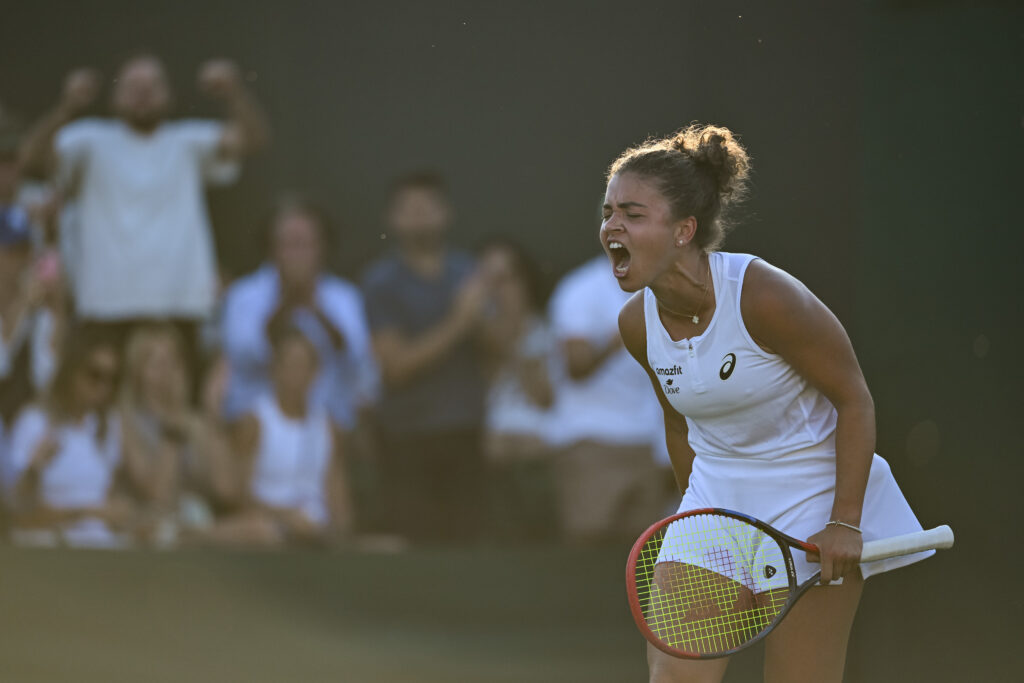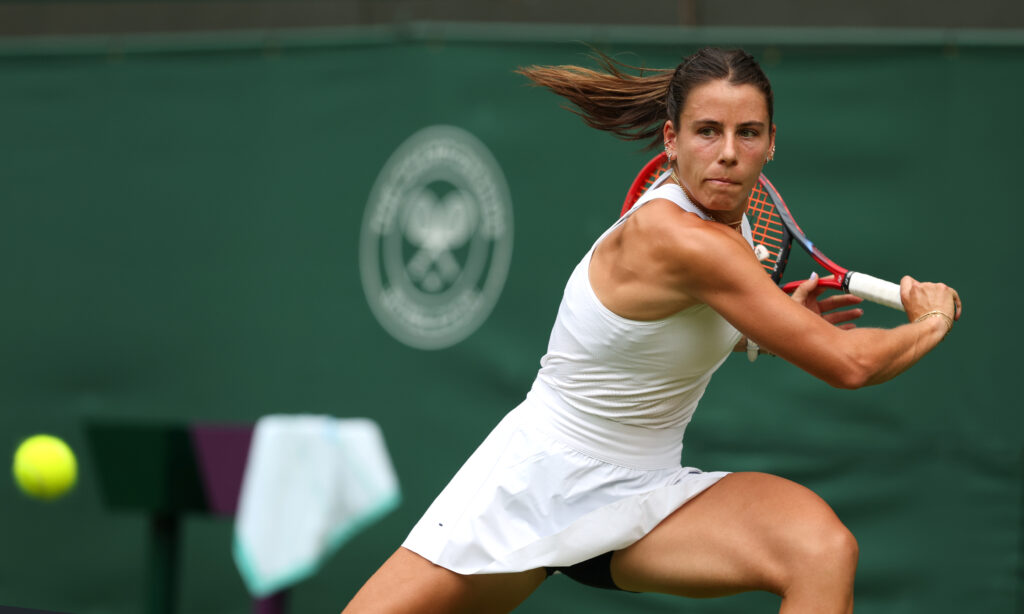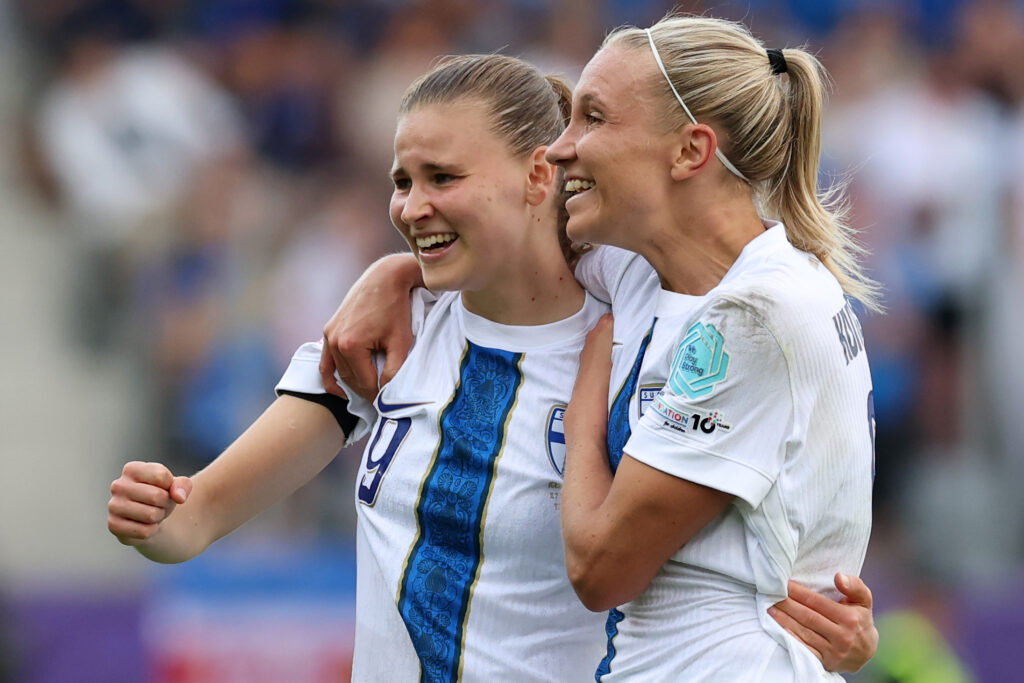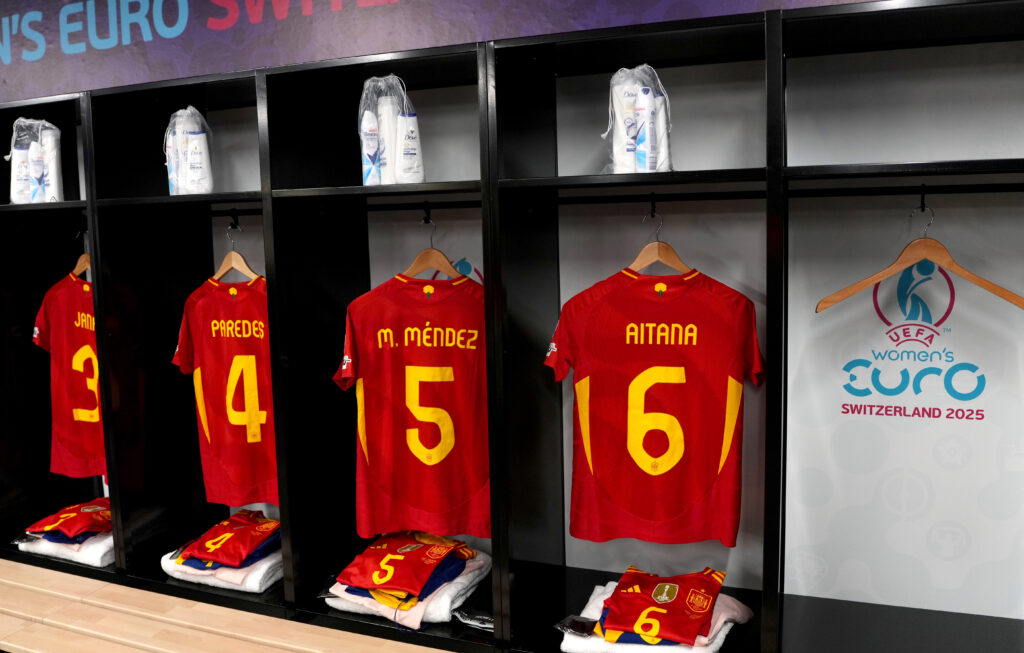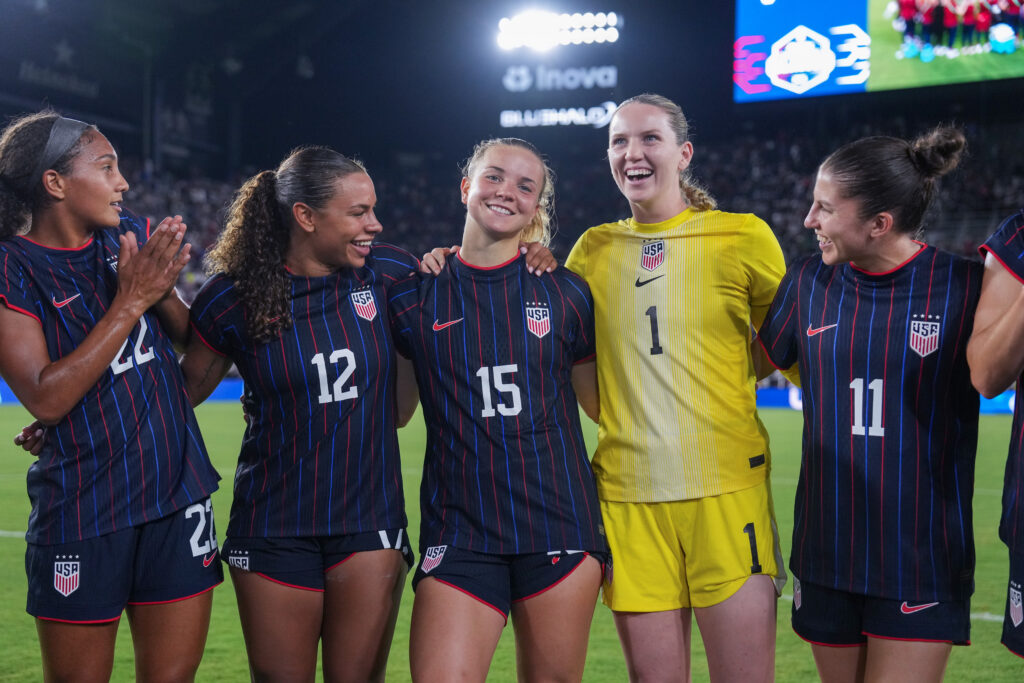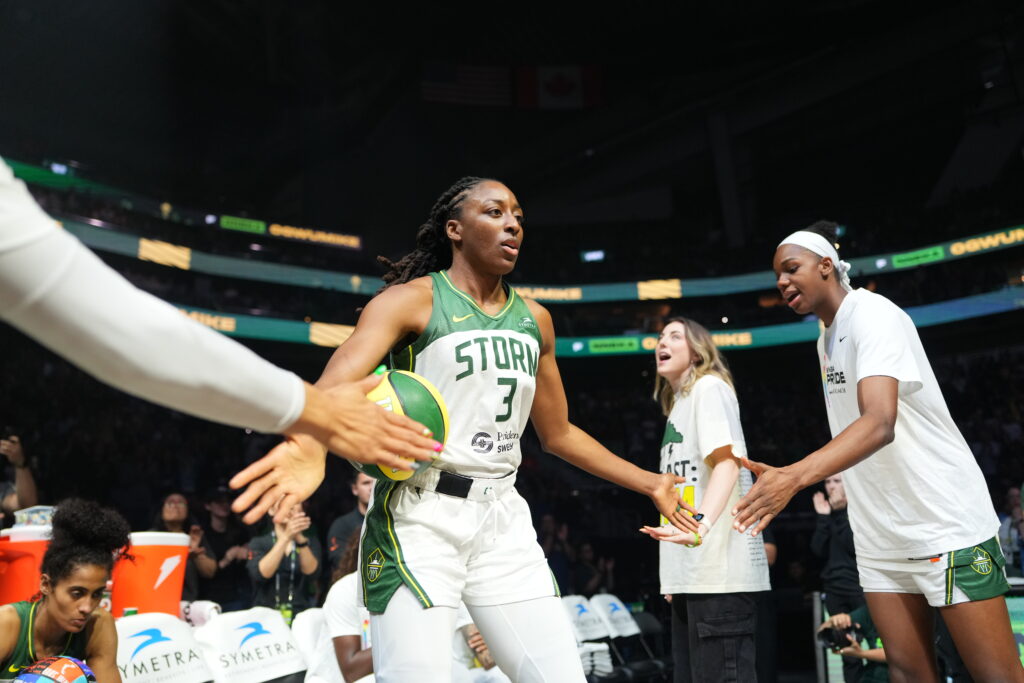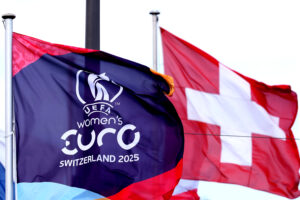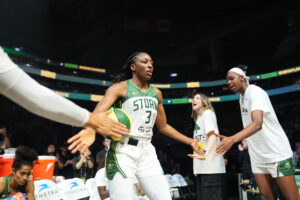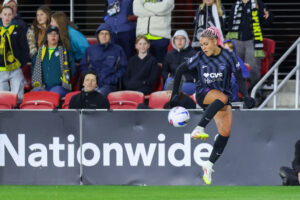Hilary Knight hasn’t given much thought to whether the Beijing Games will be her last. The only player on Team USA making her fourth Olympic appearance, Knight, 32, takes the ice with the same childlike excitement as she did 12 years ago, for her first Olympics in Vancouver.
Only when she feels like she’s no longer making an impact on the team will she hang up the skates, Knight explained in a phone conversation the night before departing for Beijing. And based on the way she has been playing so far, that point seems far away.
Through four games at the 2022 Olympics, Knight is tied for second on the team with five points. She contributed three goals and two assists as the U.S. went 3-1 in group play to enter the quarterfinals as the No. 2 seed. The Americans will face Czechia on Friday (Thursday, 11:10 p.m. ET) for a spot in the semifinals and their fourth straight gold-medal game, likely setting up a chance for redemption against rival Canada, who beat them 4-2 on Tuesday.
For Knight, who was a part of the U.S. team that took down Canada in PyeongChang four years ago, the opportunity is golden.
Knight spoke with Just Women’s Sports ahead of the Olympics about preparations for Beijing, the rising parity in women’s hockey and what’s next in her illustrious hockey career.
Since the last three games of the Rivalry Series were canceled, you spent over a month practicing instead of getting final tune-ups in. What was that like?
Oh boy, the ups-and-downs of the COVID world. I think what people don’t necessarily understand and what sort of strikes the fear in athletes is if you catch COVID, you essentially can’t compete in the Olympic Games. It’s been really hard to try and keep safe, especially in a normal population that doesn’t necessarily understand what you’re going through and you don’t have enough time to explain it to a stranger while you’re wearing a mask outside. But outside of that, it’s been unique and interesting and a lot of fun at the same time. I think what’s exciting about our group is our uncanny ability to address and adapt all the time. I think it’s really become a strength of ours.
What did that look like, trying to weather the COVID precautions while practicing and staying ready?
Getting creative for training. With scrimmages, we sort of had to trail off doing those just because of the potential risk of contracting COVID. What’s so great about our team sport is you go through these challenges with one another, and I have 22 other family members to navigate it with. But at the same time, if one of those family members goes down for the count, it affects us tremendously as we look to compete in probably the most competitive Olympics for hockey yet.
These are your fourth Olympics. Thinking back on those first three, do you feel like you have a different perspective of these Games?
Not necessarily. I think what’s cool for me is I have experience. That’s obviously special and I don’t want to minimize that in any way, because to make it to four is extremely hard and remarkable in its own right. And yes, it’s my success, but there are others who equally share in that with all the sacrifices they’ve made, and all my partners who helped get me here. So I understand that, but at the same time, each Olympic Games is so different and that’s what’s exciting. In many ways, you still feel like it’s your first time and I think you have to have that childlike mentality of being excited because it’s so unique and so special and so extraordinary. That’s what I feel, the beauty in being able to experience that not once, not twice, not three, but four times now.
I don’t think you could have asked for a more extraordinary Olympic experience than the last one in 2018. When you came back from PyeongChang as gold medalists, I’m sure it was a whirlwind. How long did you let yourself celebrate before refocusing on the next thing and looking ahead to Beijing?
I think at least a few months. Like, I stopped skating for a little bit just to give my hips a break. But it was interesting. For me, that Olympic residency period leading up to the actual Olympics was extremely challenging and taxing, mentally and emotionally. So I needed to kind of recharge those batteries. But it’s such a special group, so it’s hard not to get up and to get ready for this group. I didn’t really want to miss a beat or take too much time off because I definitely wanted to join the squad and earn a spot again.
You finally got over the hump in 2018, winning Team USA’s first gold since 1998. Is there anything you learned from that experience that you’re applying to these Olympics?
Not really. It’s funny because I get a lot of questions about defending a gold. It’s like, that was four years ago. It feels like a lifetime. And that was a different team and this is a different team now, and we still have to go through a tournament. We don’t get a pass until the final. I think people kind of forget about that. It’s like, well this is a completely new squad and we have a great squad. I’m really excited to put ourselves in a position and have an opportunity to compete in that final.
9 seconds after Compher's goal, @HilaryKnight gets her second of the period for #TeamUSA.#WinterOlympics pic.twitter.com/dhlxfYBWf7
— USA Hockey (@usahockey) February 6, 2022
You lost some mainstays from 2018, like the Lamoureux twins and Meghan Duggan, but you returned 15 Olympians and then you have some new newcomers. How would you describe this group overall?
We’ve always had a really great mixture of players. I think what’s important for us and part of our culture is realizing it doesn’t matter if it’s your 99th Olympics or your first — when that opportunity comes, you just be you and do your thing. Like, you’re here for a reason. Embracing that and making sure everybody feels empowered to go out there and perform at her best is something that we stress and something that we hold in high importance.
You mentioned that this is probably going to be the most competitive Olympics yet, and to repeat as gold medalists, you’ll likely have to go through Canada, your biggest rivals. How are you viewing that team in 2022?
It’s one of those rivalries where it’s just so beautiful. It’s one of the most competitive rivalries in sports, and we could play 365 days of the year, and it would still be that special. I think it’s a tribute to the level of respect we have for one another, whether we like to admit it or not. We’re going to bring our best game. I think that’s what makes those games so Disney-like in a way. You get these crazy momentum shifts in a game and all of these talented players just gutting it out, and it really makes for some great hockey that always goes down — I feel like — in the history books.
Do you feel like this Canada team has changed since 2018? Obviously they have some different players.
Yeah, they have different players, like we have different players. They’re a good team. But it’s funny, I don’t even really need to look at their roster. I just know that they’re going to be good, and they feel similarly about us. It’s just one of those things that we’re both going to be really strong, and what’s really unique and cool about the sport right now is that it’s so competitive and the level of skill and talent that’s coming up in the next generation is incredible. What’s really exciting to see are those young women showcasing their abilities and taking their game to the next level.
What other teams have you had your eye on in the years in between the PyeongChang and Beijing Games?
You can tell who’s been putting money and resources into their program. It’s by no mistake that Finland was in a world championship final in 2019. They’re a great team. Russia’s another great team. The Swiss are good. You really can’t underestimate any team. Japan’s great, too. We want to win, but when you take a step back, it’s encouraging to see hockey at this level.
Entering such a competitive Games, do you have any advice for the first-timers on the team about how to approach it and the right mindset to have?
Honestly, it’s just have fun. I think the moment sometimes can really eat people up because it’s the Olympics and here’s all this extra pressure, there’s media, there’s all this stuff. You feel like the entire world’s watching, which they are, but you can never lose sight of why you signed up and what makes you great. Just trying to emphasize that as we go through the tournament.
I know you’re focusing on the present, but have you given any thought to whether this might be your last Olympics?
Not really. I’ve been fortunate enough to just have two feet in this experience and really embrace that in the day to day. But my brothers were joking around — they’re like, “Well, we can’t go to Beijing, so can you do another four?” I’m like, “Yeah, hold on, let me just sign up for another four.”
I mean, I think my biggest thing is, one, I have to love it. And I know that sounds silly because obviously there’s hard work that’s involved, but you can’t do this for this long if you don’t love it. It’s not easy. And then, two is to be able to contribute to this team. I’m never fond of seeing players kind of hold on just to hold on. I really want to have an impact on this team. And if I can check enough boxes, then yeah, I’m still game. I’m still going.
Hannah Withiam is the Managing Editor at Just Women’s Sports. She previously served as an editor at The Athletic and a reporter at the New York Post. Follow her on Twitter @HannahWithiam.
